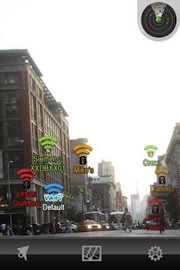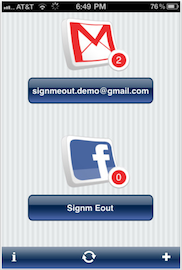 (The King of Code contest is sponsored by Windows Phone and is open to developers on any mobile platform.)
(The King of Code contest is sponsored by Windows Phone and is open to developers on any mobile platform.)
Daniel Shein is the quintessential mobile developer. Breaking into the space as early as 2005, his creations run the gamut from simple games to augmented reality applications to life-hacking mobile tools.
After cutting his teeth on e-commerce websites — programming in PHP, Perl and Javascript for various companies — he got into phone development with J2ME. One of the founders of XSights, working on image recognition over video calls, he became increasingly involved with mobile. And in 2008, he jumped headfirst into the iOS and Android platforms as an independent developer and never looked back, creating apps for fun, but also for large companies, including banks and insurance firms.
All of this experience set the table for his next big move, the founding of LoFT, a startup focused on innovative augmented reality apps. There, he created one of his favorite and best known applications to date: Lookator.
reality apps. There, he created one of his favorite and best known applications to date: Lookator.
Now critically-acclaimed, Lookator is one of those apps that provides a simple yet critical service — and is acknowledged as one of the first truly useful augmented reality creations. It’s a Wi-Fi access point scanning tool that shows users which nearby Wi-Fi signals are strongest. Its biggest advantage, however, is that it’s user friendly.
“In college, all of our classes had horrible Wi-Fi, and we wanted to know where to sit to get the best signal,” Shein says. “All the existing tools were too technical and not very pleasant to use. People just want to know where to go, not stare at a bunch of technical mumbo-jumbo.”
Shein and his friends decided that augmented reality would be the perfect way to indicate where the best access points were located. Enthusiastic response to the application proved they were right almost immediately, leading to a number of other augmented reality products related to wireless internet. Today, Lookator boasts nearly 100,000 downloads.
Shein’s second big hit, SignMeOut, hit the market in 2010, and is his main occupation today. Described as a tool to manage online identity no matter where you are, SignMeOut started as a personal tool just for Shein himself.
“I’m a person who tends to leave his Gmail open in random places,” he says, adding that the app was exactly what he needed “to keep access to my Gmail under control.”
After witnessing the recent surge in hacker attacks on large services like Sony’s PlayStation Network and Amazon, Shein realized how spread-out and out-of-control online identities have become, and that there should be a powerful option available to keep track of and secure private information.
“What better way to keep [online identities] managed and safe from prying eyes than with the one thing that’s always with us and that we hardly share — our phones?” He says.
 After releasing the app, Shein says positive feedback started rolling in. Users were astonished to discover that their Facebook accounts were still logged in and accessible in six, seven or eight other locations they had completely forgotten about.
After releasing the app, Shein says positive feedback started rolling in. Users were astonished to discover that their Facebook accounts were still logged in and accessible in six, seven or eight other locations they had completely forgotten about.
With a growing client base, Shein is now working to expand SignMeOut’s utility to desktop and laptop computers and even people’s homes — making more personal information manageable from hand-held devices.
“I love how intimate mobile devices are to us,” says Shein. “People form a bond with their phones and applications. It becomes an extension of you and what’s important to you. Show me what apps you have and when you use them, and I’ll tell you who you are.”
After six years in the space, Shein’s enthusiasm for mobile hasn’t waned one bit. There are just too many contexts to explore.
“Your phone can be a lean-in game experience, an ambient GPS guide, or just an agent notifying us of things when we need it to,” he says. “It’s so many different things, and we all use our phones whatever way is personally good for us.”
According to Shein, mobile app development has hit a sweet spot now that consumers are comfortable interacting with smartphones, as well as inputting, searching for and displaying data. He predicts that in the near future mobile phones will serve as bridges to even larger interactions with surrounding environments.
“We can already stream videos from our devices to other devices on the fly, payments are coming soon and that’s only the tip of the iceberg,” he says. “Soon, we’ll be interacting with our TVs, our cars, our kitchens. I hope we aren’t more than a few years away from being able to go to the supermarket on the way home from work and ask our fridge if the milk is spoiled or if we’re out of eggs.”
For the most part, Shein has focused on apps for iOS and Android. There’s no resisting Apple’s mature market and user base, cross-platform capabilities and streamlined payment mechanism. It’s worth the limitations that the company imposes on developers, he says. Android almost complements iOS, offering enormous reach and openness, but for a much more fragmented marketplace. Neither platform is perfect, but together they do the trick, he says.
While he hasn’t ventured into Windows Phone in any major way, Shein says he’s excited by the platform’s potential. He’s looking forward to seeing how Microsoft evolves Windows Phone 7 alongside its other products over the next months.
“Microsoft products are everywhere — they run most computers, are in millions of homes in console form, and have a mature and robust cloud service in Azure,” he says. “There is huge potential for some really amazing things we’ll be able to do with our mobile devices as extensions of ourselves in such a digital environment.”
In the meantime, Shein’s plan is to continue focusing on SignMeOut and expanding its capabilities, user base and connected services. At the same time, he’s keen on his team gaining new knowledge from the experience that he might be able to apply to future projects. Already, they are revisiting augmented reality to see what might be possible, placing emphasis on user experience.
“We want people to bond emotionally with our products, which all starts with designing a flow and a look and feel,” he says. “We have an awesome designer that’s worked with us on a lot of projects and continues to challenge and inspire us.
“I’m always trying to be ahead of the curve with great technology and great design.”
Every week, with the sponsorship of Windows Phone, VentureBeat is crowning the very best mobile developers as “King of Code.” We’re looking for innovative developers who are really pushing the envelope in the mobile space, regardless of the platforms they’re developing on. Enter here for a chance to win a profile on VentureBeat.com, a $1,000 AMEX Gift Card, an Xbox & Kinect Package, and/or a Windows Phone 7 device.
VentureBeat's mission is to be a digital town square for technical decision-makers to gain knowledge about transformative enterprise technology and transact. Learn More
